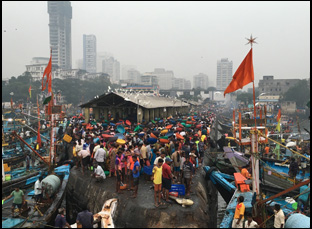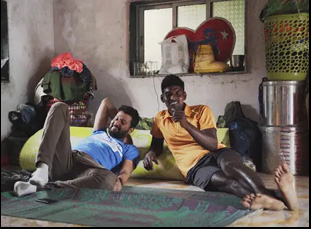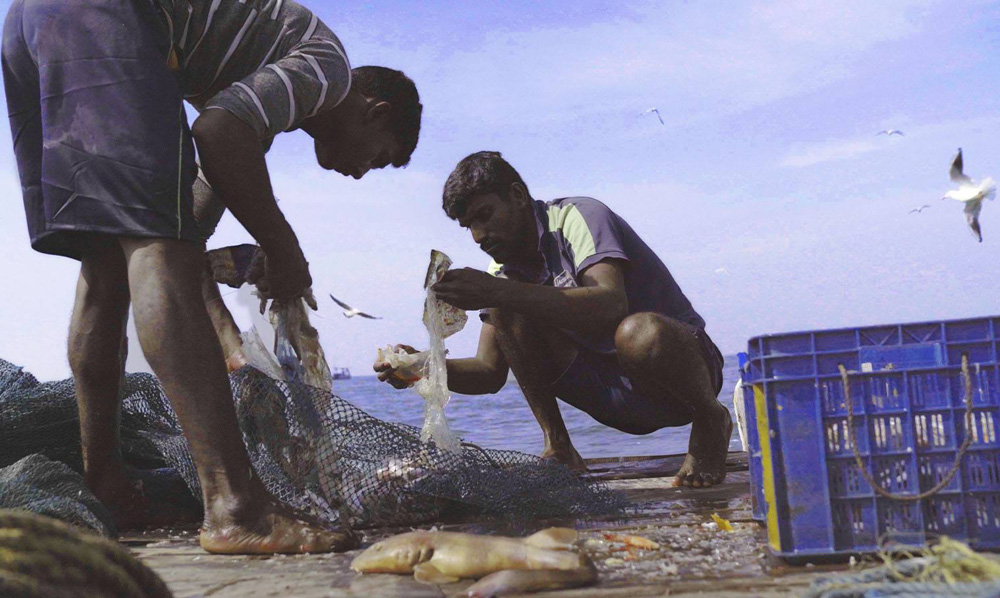“Mother Sea, protect our son,” Rakesh and his wife can be heard saying in blessing their newborn at the start of “Against the Tide,” holding a small ceremony inside their modest home off the coast of Bombay. They don’t need much inside the house when they have a whole ocean to draw on outside where Rakesh has carried on the tradition of so many generations of the Koli caste before him, making the most of what the water provides in terms of fish, a business of limited margins but nonetheless has never left the family needing much else. However, changes in weather patterns have brought fewer fish to the region and there are more industrial rivals with the ability to scoop them up, putting into jeopardy the sustainable life that the Koli community has always been able to rely upon.
There’s a more sprawling story that Sarvnik Kaur could tell in “Against the Tide,” but in limiting her focus, she tells a grander one as the filmmaker comes to follow Rakesh and Ganesh, a more enterprising fisherman who brought back business lessons from his studies in Scotland, as they rethink their futures upon watching their catch diminish in recent years. Although they have to wonder what’s emptying out the sea, their plight reflects a hollowing out of an entire culture on land when their work has been at the core of their beliefs, achieving a balance of putting back into the world what they’ve taken out and while Rakesh has faith that things will pick up once more, the less patient Ganesh looks into the purchase of LED lights that will allow him to wade into deeper and more dangerous waters that are less likely to have been picked over. As Kaur stays by their side over the course of six years, the director is able to raise questions that all of India and the world as a whole will need to find answers for and attitudes towards tackling them are bound to differ wildly.
“Against the Tide” arose from Kaur questioning herself as a resident of Bombay, making the bustling city her home over a decade ago, giving her plenty of time to settle in yet hardly feeling as if she call herself a local when many of her neighbors have roots extending for centuries and while the loving way the area is filmed becomes a clear expression of the passion she has for it, the filmmaker also summons the spirit that has developed over centuries by those who have been around to build it up and is in need of great protection now when ecological systems that have long been in place find themselves under threat due to massive environmental shifts. Earning a special jury award for verite filmmaking upon its premiere at the Sundance Film Festival earlier this year and recently scoring nominations from both Cinema Eye Honors and the Gothams, the film is now making its U.S. theatrical debut in New York and the director graciously took the time to talk about devoting the better part of the last decade to following Rakesh and Ganesh, setting aside all she knew to better understand the situation that was unfolding in front of her and how the film has already made an impact on those who haven’t been used to having the spotlight shined on them.

Over the past 15 years, I’ve learned to think of Bombay as home, and that is very intricately woven with my own grandparents and their move from Pakistan to India at the time of India-Pakistan partition. My grandfather’s always wistfully spoken about home, but it’s almost this elusive thing because he couldn’t go back to Pakistan to revisit it. That idea of home or not having one was always a dear idea to me and being able to call Bombay home gave me a lot of emotional connect with the city. When I was filming my first film about the music of resistance in Kashmir and people recording their lived memories in their music — their hip-hop and their blues — I started to hear that the Kolis, the indigenous people of Bombay, were going to lose their ancestral villages because the road [being developed] was going to displace them from that land. The parallels between the two stories were limitless for me [when] in Kashmir, people are being displaced in the name of nationalism, and in Bombay, they’re getting displaced in the name of development, and the collective narrative of ours doesn’t take into account the individual trauma that it causes. So when I came back to Bombay, I started an inquiry trying to find out what is the deeper story here.
It was interesting to hear that you began to film with a fisherwomen’s collective in Bombay. How did you find your way to Rakesh and Ganesh?
Yes, I just wanted to be introduced to what it meant to be a fisherperson and I had a few friends there [in] this collective of about 200 women, and when I met them, they were setting up a protest against the Bombay authorities for turning a 175-year-old fish market into a mall to sell high street fashion and other lifestyle goods. These women obviously have known and seen Bombay grow around them, and were being promised that they would get a basement to sell their fish from, but knew that these promises will never come to anything, so they planned a protest outside the State Parliament [in Bombay where] they tried to block the traffic. Instantly, police came and they were put back in their buses and taken to an isolated spot where some ministers came to talk to them and resolve the issue, but all that protest came to nothing and I felt there was almost this desensitization or apathy in the city about the Koli people and their concerns.
People in Bombay are really struggling to survive. It’s a tough city to be in and empathy for anyone else’s concerns is a big ask out of this city, so I started making small videos for this women’s collective was when I was called for lunch by one of the women who worked there, and I met Rakesh for the first time. Rakesh is our traditional fisherman. He basically fishes only in the shallow sea around his village, and he took me fishing. We caught fish. We cooked it, ate it, and he said to me that “A Koli fisherman will never go hungry. All I have to do is go into the sea to be able to take care of my family.” And there was this amazing amount of self-confidence in this person and the faith that he had in the sea and that it would always provide enough for him and his family. I did not know at that time that I’d met my first character.
Then I met Ganesh at another protest site where this man was not talking language of protest. He was talking about Kolis being the last bastions of Bombay, and without them the city would drown because [those that moved there] cut off all the mangroves and made high rises over there and then he was talking about plastic and chemical pollution in the sea and the pressure that is on the Koli fishermen. He was almost urging the community to modernize, and to recognize the fact that it’s very hard to survive in this city. [He would say] “Profit is not in the shallow water, it’s in the deep sea,” and I was quite taken by this man. Earlier, I used to think that I’m making the film for the Koli people, but after talking to him, I realized that actually I’m making a film for modern people like me because it’s true that people like me would, for the love of a house with a sea view, actually construct tall buildings around the coast and destroy whatever little we have.
I think that resonated a lot with him, and we started spending more and more time together. He showed me how the commerce of fishing was done and one day I walked into Rakesh’s house to see Ganesh, and that started a long year of basically me drinking a lot of whiskey and eating fish with them and the two men they would [spend] night and day arguing and cursing one another, getting up and saying “we’ll never see each other again” and then be back again together a few weeks later, so they were so interesting to me, having this shared love of the sea, but not the same vision of what future should be like. That’s how I decided that my film’s going to be a series of conversations between these two men and how pulled apart they are but actually how much they mirror one another.

Absolutely. The reason behind doing nonfiction for me is exactly that. At some point you just surrender to life as it is happening. I used to basically feel like my creativity isn’t wide enough and their lives are limitless. They’re infinite. So if I can just turn up every day, I will be able to observe something which says something bigger about the world that we are in through very small non-events of every day because there’s something cyclical about life. Events repeat themselves, but underneath that they tell us a lot about how things are in the world.
Anecdotally, [there was] one day Rakesh was at home and I was telling him that I didn’t know how to film him anymore because I filmed him for three years and all the material [we filmed] looked exactly the same. And this man takes my marker and starts to draw on the whiteboard — he draws his boat from observational perspective, a bird’s eye perspective, an underwater perspective and then he draws the moon. And he starts telling me about the movement of the moon and how the tides shift. And I realized for the first time after three years of filming with him that what he was explaining to me was this complex oceanography. This person hasn’t really attended much school — he used to get bored there — and here he’s talking about how he basically harnesses the current of the sea. He goes to fish when the tide is rising, he casts his net and when the tide is falling he goes to pull the net out [because] in between as the currents change, the fish come and get trapped in his net and he then can use the moving currents to pull the net out. He just knew if you turned up at the right time things will happen.
That’s almost the belief I kept while I was filming was that I may not know necessarily how today is going to pan out. But eventually over a course of long period of time if I just surrender to this process or accept it for what it is, eventually I will find out. Similarly, I was open to being proven wrong. When I started following Ganesh, I had guessed that he’s eventually going to do LED fishing because even though he’s sitting on that moral dilemma of whether to do LED fishing or not, his financial crisis [made it] seem like he was eventually going to succumb to it, so we just had to follow and see why and how it happens. When we went to the deep sea, my entire crew were very sure that Ganesh was going to dangle LED lights and we were going to catch lots of fish and he’s going to recover from his losses. But that did not happen.
That was perhaps the most difficult scene we ever filmed in the six years because that moment was so tense. Ganesh went into the cabin and cried and at that moment it felt like if we couldn’t breathe [because] emotionally it was such a wrought moment. For two months after coming back, I kept thinking that I don’t have a film anymore because he didn’t catch fish. But the obvious thing sitting in front of my nose that I couldn’t see was that that is the story that we have reached that point where technological intervention not going to save us. There is something very wise and eternally intelligent about Rakesh when he sells his bigger boat to buy a smaller boat. He’s trying to reduce his costs to maximize his profits and he’s [both] so in tune with the time, but also so radically against the times that we are in where we must all upscale and we must always go bigger and dream bigger. [Instead], here is this person saying that “The experience of being alive has nothing to do with more. It has to do with being there and the comfort of family and knowing that there is the sea that will provide. If I just know how much I need, that is enough.”

Retrospectively, I’m glad I got the resistance that I got because I did not know myself that I knew the film so well in the sense that once I started to get challenged, it brought a lot of things that were in my subconscious to the surface. If my editor and I are not on the same page about where this film should go, you have to find it in you to find the vocabulary to make it, so I had to constantly go deeper and feel more, to try to go beyond the critique to bring value to the story that’s unfolding.
For instance, my editor didn’t think of Rakesh as aspirational, but he was for me and I started to [ask] if my editor is not feeling it, then what can I do to bring that lens of how I look at him an what I see so that it is seen by everyone in that way. During that first [baby naming ceremony] that you hear, “Fear not, fear not” and I had to dig deeper into my experience of filming [that moment] because I’d heard that at both the baby naming ceremonies and I’d recorded it, but I’d buried it somewhere deep in my subconscious. Then it came to the surface that this is how I want to start [the film] because I want to introduce my character as this fearless person who’s been handed over this beautiful secret that you’ll be taken care of and there is nothing to fear. So it was a lot of distilling of the six years of experience which had gone and buried itself that started to come to the surface because of that dire need to find the vocabulary within you to be able to bridge that communication that is not happening.
It came off magnificently and I understand recently, you’ve been traveling across seaside villages in India with the film. What’s it been like getting this out into the world?
It’s been really nice. We had our premiere in Bombay a few weeks ago and the level of engagement — the laughter, and then came the tears — it was just really spectacular. The joy of being able to share that moment of 500 people watching alongside Ganesh, Rakesh and their families was something else. And an audience member asked, “We would like to hear from the women and what was it like to have the camera wielded on them?” And Ganesh’s wife came onto the mic and she said, “It was really nice. [Sarvnik] made us really comfortable, and we would often forget that there was a camera.” But then she said, “I’ve never been appreciated in my life, not even by my father and I’m so happy that I’m getting to talk to 300 of you.” And I had to cry because that moment was so special. It was just this occasion of arriving here together. We were so naturally in a friendship [from the start] and something beautiful has come out of it and emotionally it’s left a memory, which is to be cherished. We’ve all grown from it and it was really something else.
“Against the Tide” will screen in New York at the DCTV Firehouse from November 24th through November 30th with the filmmakers in attendance on November 26th and 27th.




